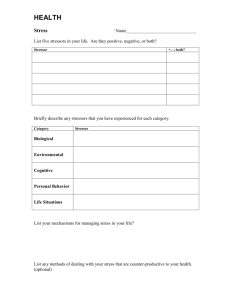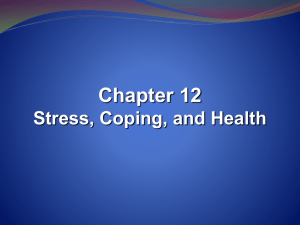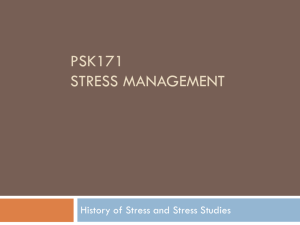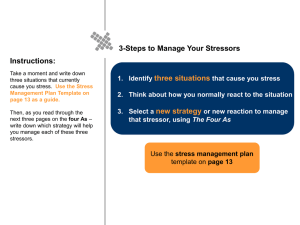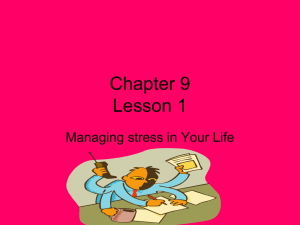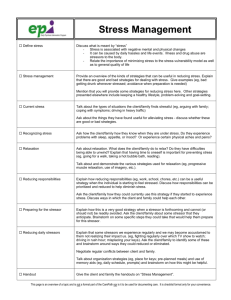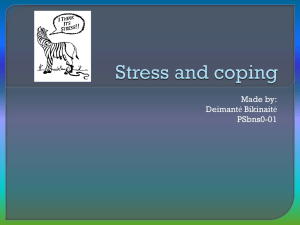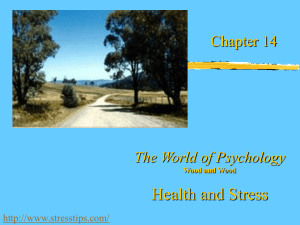Stress, Coping, and Health
advertisement
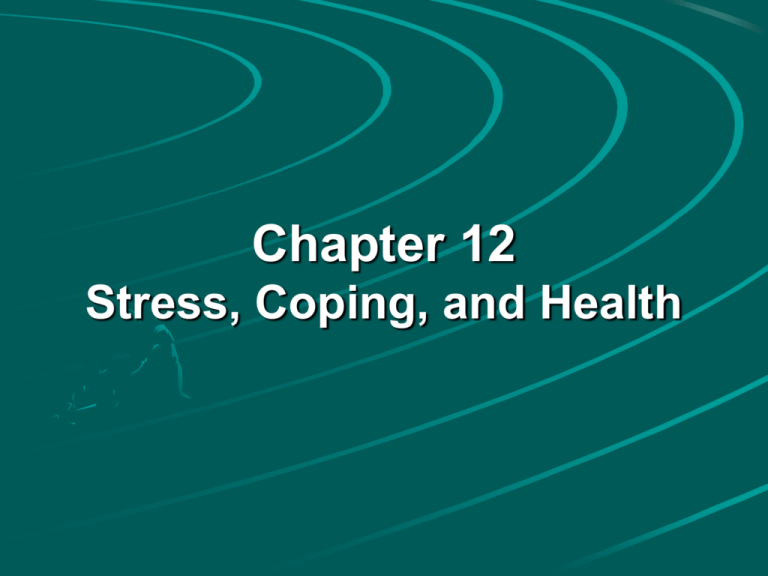
Chapter 12 Stress, Coping, and Health Behavioral Medicine An interdisciplinary field of science that integrates behavioral & medical knowledge & applies it to health & illness Health psychologists study the effects of behavior & mental processes on health & illness. Biopsychosocial model: an interdisciplinary model that assumes that health & wellness is caused by a complex interaction of biological, psychological, and sociocultural factors. What Causes Stress? Stress: our response to events that disturb, or threaten to disturb, our physical or psychological equilibrium Stressors: external or internal events that challenge or threaten us Stressors Major cataclysmic events Personal major events Minor stressful events, called hassles Even positive events can tax body’s resources and cause stress. – negative events induce more stress than neutral or positive events. Mind, Brain & Body At any moment, your brain is creatively performing about 400 billion actions. You are only conscious of around 2000. Dr. Caroline Leaf Who Switched Off My Brain? Mind, Brain & Body Dr. Candance Pert – Brain and mind function as a single psychosomatic network. – The crucial link is emotions. Biochemical molecules of emotion are like “photocopies” of thought. Mind, Brain & Body The more you think, the more you understand. The more focused and aware you are, the stronger your memory (dendrites firmly attached). During sleep, your thoughts are sorted out. Glial cells prune dendrites. Mind, Brain & Body Thoughts are brain electro-chemical patterns. – Negative emotions are fear based. – Positive emotions are faith based. Everything you see, hear, and feel becomes part of your thought life. Mind, Brain & Body The thalamus sends an electrical message to the cortex and activates a memory. Your limbic system is a chemical factory. – The amygdala is a library of emotional perceptions to check the memory. It may dominate the cortex. – The hippocampus will hold short-term memories for 48-72 hours. – The hypothalamus translates the conclusion to a bodily response. Mind, Brain & Body Emotions are cellular signals that translate information into physical reality. The substances used include peptides, steroids, and neurotransmitters. About 90% of this process is nonconscious and 10% conscious. Hans Selye: Stress as a Set of Responses to Demands General Adaptation Syndrome (GAS): Hans Selye’s stress model in which an event that threatens an organism’s well-being (a stressor) leads to a threestage bodily response: – Stage 1: Alarm – Stage 2: Resistance – Stage 3: Exhaustion Hans Selye: Stress as a Set of Responses to Demands General adaptation syndrome (GAS) Stage 1: Alarm – Upon encountering a stressor, body reacts with “fight-or-flight” response and sympathetic nervous system is activated. Hormones such as cortisol and adrenalin released into the bloodstream to meet the threat or danger. The body’s resources now mobilized. Hans Selye: Stress as a Set of Responses to Demands General adaptation syndrome (GAS) Stage 2: Resistance – Parasympathetic nervous system returns many physiological functions to normal levels while body focuses resources against the stressor. Blood glucose levels remain high, cortisol and adrenalin continue to circulate at elevated levels, but outward appearance of organism seems normal. Body remains on red alert. Hans Selye: Stress as a Set of Responses to Demands General adaptation syndrome (GAS) Stage 3: Exhaustion – If stressor continues beyond body’s capacity, organism exhausts resources and becomes susceptible to disease and death. The General Adaptation Syndrome Psychophysiological (Psychosomatic) Illnesses Are Stress Related Psychophysiological disorders: physical conditions, such as high blood pressure and migraine headaches, that are caused or aggravated by psychological factors such as stress Two bodily systems have received the most attention. Psychophysiological Illnesses Are Stress Related The cardiovascular system is strongly affected by stress-related emotional responses – High blood pressure (or hypertension) – Instances of ischemia—heart does not receive sufficient blood – The release of cortisol from the adrenal cortex and epinephrine from the adrenal medulla, which ultimately leads to artery blockage and heart attacks Psychophysiological Illnesses Are Stress Related – The immune system: a complex surveillance system of specialized cells, tissues, and organs (the body’s primary defense against disease) reacts to and destroys cells determined not to be part of the body. Three important types of cells in the immune system are B cells, T cells, and natural killer cells. Both acute and chronic stress can reduce the efficiency of the immune system, making the body more susceptible to disease. Cognitive Appraisal Richard Lazarus (early researcher) Cognitive appraisal is essential in defining whether a situation is a threat, how big a threat it is, and what resources you have to deal with the threat. While responding, you build your mental framework. You exercise your will to accept or reject information (corpus callosum). – Accepted information is amplified. – Rejected information will disappear. You must feel something is true to believe it. Emotions (limbic system) tells you what is real, true, and important. Cognitive Appraisal Lazarus identified two cognitive appraisal stages: (notice fear vs. faith) – Primary appraisal: initial evaluation of situation; assess what is happening, whether it is threatening, and whether you should take some action in response to the threat – Secondary appraisal: assess whether you have ability to cope with stressor. The more competent you perceive yourself to be, the less stress you experience. Cognitive Appraisal Lazarus’s model conceives of the person as an active participant in evaluating and responding to stressors. Problem-focused coping: a strategy aimed at reducing stress by overcoming the source of the problem Emotion-focused coping: efforts to manage your emotional reactions to stressors rather than trying to change the stressors themselves Predictability and Control Can Moderate the Stress Response Whether an event becomes a harmful stressor is often determined by: – It’s predictability If you know that a stressor is coming but are uncertain when it will occur, you experience greater stress. – Factors related to control over it; e.g., having faith Predictability and Control Can Moderate the Stress Response If you believe that you have some control over a stressor, you usually feel less stressed. When you doubt your ability to control a stressor, you are more likely to use emotion-focused coping. Locus of control: the degree to which you expect that outcomes in your life depend on your own actions rather than the environment. Repeated failure at trying to eliminate stressors can lead to a feeling of learned helplessness. Hostile & Pessimistic Persons Are More Reactive to Stressors Type A Behavior Pattern – characterized by competitiveness, impatience, ambition, hostility, & a hard-driving approach to life is associated with increased risk of heart disease Type B Behavior Pattern – characterized by a patient, relaxed, easygoing approach to life, with little hurry or hostility only half as likely to develop heart disease Hostile & Pessimistic Persons Are More Reactive to Stressors Pessimistic explanatory style: – tendency to explain cause of negative uncontrollable events as one’s own stable personal qualities affecting all aspects of life – Associated with health problems and premature death Optimistic explanatory style: – tendency to explain cause of uncontrollable negative events as temporary, external factors that do not affect other aspects of one’s life – Associated with good health and longevity These Patterns Can Be Changed Deal with old issues Don’t deny emotions Forgive De-guilt (make amends; forgive yourself) Question beliefs and assumptions Talk with somebody you trust Social Support Has Therapeutic Effects People with more extensive social support networks are happier, have stronger immune systems, and live longer than those who are socially isolated. Social Support Has Therapeutic Effects Common benefits of social support: – Provides increased knowledge about the stressor Associating with others often provides information about how to understand and emotionally respond to stressful events. – Provides opportunities to simply express our feelings, which can lead to physical benefits Choose Your Thoughts Don’t unnecessarily expose yourself to negative thinking Don’t mindlessly take in information Consciously decide what thoughts to accept or to reject Consciously decide what thoughts to entertain Be conscious of what you say (especially to yourself) Aerobic Exercise Can Increase Physical & Mental Health Aerobic exercise: sustained exercise that increases heart and lung fitness – Has a positive effect on both physical and mental health – Activity that increases heart rate into a certain range for at least 12 to 20 minutes fits this definition – It is possible to overdo a good thing. Relaxation Training Is Effective in Reducing Stress Many psychologists recommend relaxation training as an effective stress antidote. The most basic relaxation technique is progressive relaxation, a stress-reducing technique involving the successive tensing and relaxing of each of the major muscle groups of the body.
